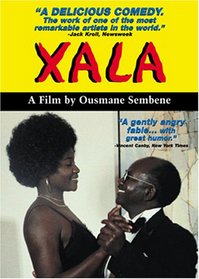| Actors: Fatim Diagne, Makhouredia Gueye, Thierno Leye, Dieynaba Niang, Myriam Niang Director: Ousmane Sembene Creators: Farba Seck, Georges Caristan, Orlando L. López, Seydina D. Saye, Ousmane Sembene, Paulin Vieyra Genres: Indie & Art House, Comedy Sub-Genres: Indie & Art House, Comedy Studio: New Yorker Video Format: DVD - Color - Closed-captioned DVD Release Date: 05/31/2005 Release Year: 2005 Run Time: 2hr 3min Screens: Color Number of Discs: 1 SwapaDVD Credits: 1 Total Copies: 0 Members Wishing: 9 MPAA Rating: Unrated Languages: French, Wolof |
Search - Xala on DVD
  | Xala Actors: Fatim Diagne, Makhouredia Gueye, Thierno Leye, Dieynaba Niang, Myriam Niang Director: Ousmane Sembene Genres: Indie & Art House, Comedy UR 2005 2hr 3min This savagely funny satire portrays El Hadji, a prosperous, self-satisfied, politically crooked modern businessman who is struck down by the xala (pronounced "ha-la") - a curse rendering its victim impotent. While he chas... more » |
Larger Image |
Movie DetailsSimilar Movies
|
Movie ReviewsSkewering of the Senegalese "businessman" LGwriter | Astoria, N.Y. United States | 12/11/2005 (4 out of 5 stars) "This 1974 gem, by multi-talented filmmaker Ousmane Sembene, is a brutal attack on the enthusiastic appropriation by the Senegalese upper class of French colonialist culture and its dire consequences. Sembene not only wrote and directed the film; he also wrote the novel on which the film was based. In it, El Hadji, the protagonist, is one of a number of the business and political elite of Dakar (capital of Senegal) who, at the film's opening, accepts a briefcase full of payoff money from the French, presumably to "encourage" continued French business development in the country after Senegal has won its independence. But while spouting homilites attesting to Senegal's independence as a true African state, these members of the elite speak in nothing but French and look down their noses at those who speak Wolof, the native language. Even, in El Hadji's case, his daughter from his first marriage. He also decries the beggars in the streets, some of whom are disturbingly affected with serious malnutrition and physical conditions like spina bifida, and one of whom, as it turns out, is a relative of El Hadji's. The latter weds his third wife, much younger than he, but is then struck with the eponymous condition of the title, the xala, which is a curse rendering him impotent. His second wife is furiously jealous of his third. His first wife is more patient. But perhaps the most vituperative of all his enemies are ultimately his "fellow" bribees, who, in one brilliant scene, attack him for his actions that are careless enough to prevent the others in this group from being able to reap more bribes and other corrupt sources of income. He lashes back at them with how tainted they all are, including him, and then suffers the consequences. The ending of the film is the most brutal of all scenes in the film and will not be revealed here; it's stomach-churning. Along the way, El Hadji visits two different marabouts (Senegalese shamans) in an attempt to rid himself of the xala, and has as well a number of encounters with the various members of his family--wives, sons, daughters. As noted in another review of this film on this website, Sembene likely saw and absorbed the films of Luis Bunuel; there's a similarity of jet black humor in the tone of the film redolent of the great Spanish filmmaker. Sembene beautifully captures Senegalese culture in all its aspects--from the ultra-snobby rich to the desperate poor, and a couple of layers in-between as well. This is a great African film; definitely recommended." Xala John Farr | 08/23/2005 (5 out of 5 stars) "Overlooked gem amusingly demonstrates polygamy isn't all it's cracked up to be. It also operates in darker vein as one man benefits from a corrupt government that is then, all too quick to turn against him. By turns hilarious and frightening, Xala is like nothing you've seen." Tough Love khense | Los Angeles, CA | 06/04/2005 (5 out of 5 stars) "Ousmane Sembene is the Godfather of tough love. In "Xala" the likable "everyman" is only human. Finding himself immersed in easy money and asking no questions, he goes for the perks enjoyed by ancestral chieftans, throwing a big celebration to take a third wife two generations younger. However after he is dismissive of a prescribed ritual just prior to the wedding night, "Xala" the curse descends on him like falling dominoes. A love of people combined with mean spirited humor and a strong ending fire this storytelling into a timeless gem." 2.5 stars out of 4 One-Line Film Reviews | Easton, MD | 01/08/2009 (3 out of 5 stars) "The Bottom Line:
Xala is neither exceptionally well-made nor fast-moving, but for patient viewers it offers some stinging satire about the upper class in fledgling African nations; I can't recommend it to the average movie watcher, but if you like African history it may be worth seeking out for a lower price." |





